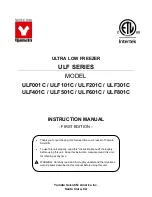
40
Energy Saving Tips
¥ Do not install the appliance near cookers, radiators or other sources
of warmth. High ambient temperatures cause longer, more frequent
operation of the compressor.
¥ Ensure sufficient air circulation and exhaust at the appliance base
and at the back wall of the appliance. Never cover air vent ope-
nings.
¥ Do not place warm foods into the appliance. Allow warm foods to
cool first.
¥ Only leave door open as long as necessary.
¥ Do not set temperature any colder than necessary.
¥ Put frozen food in the fridge to defrost. The cold in the frozen food
will then be used to cool the fridge.
Attention!
¥ Ethereal oils and organic solvents can attack plastic parts, e.g.
Ð lemon juice or the juice from orange peals;
Ð butyric acid;
Ð cleansers which contain acetic acid.
Do not allow such substances to come into contact with appliance
parts.
¥ Do not use any abrasive cleansers.
1.
Remove frozen food and the food from the refrigerator. Wrap frozen
food in several layers of newspaper. Store it in a cool place, well cove-
red.
2.
Defrost the freezer compartment prior to cleaning (see "Defrosting"
section).
3.
Switch the appliance off and remove the plug from the mains, or swit-
ch off or turn out the circuit breaker or fuse.
4.
Clean the appliance and the interior accessories with a cloth and
lukewarm water. Commercially available dish washing detergents
may also be used.
5.
After cleaning wipe with fresh water and rub dry.
Accumulation of dust at the condenser increases energy consump-
tion. For this reason carefully clean the condenser at the back of the
appliance once a year with a soft brush or a vacuum cleaner.





































